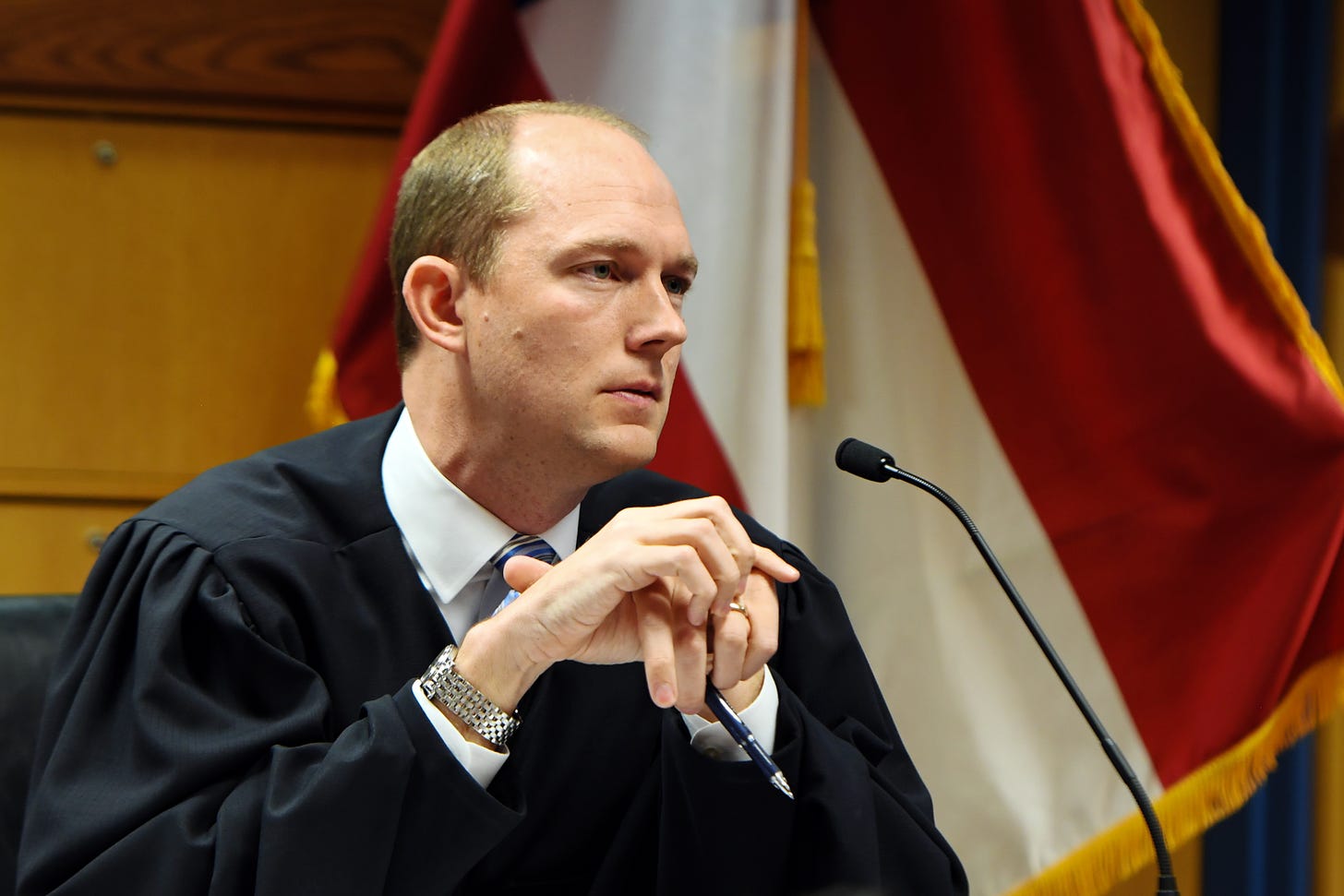Justice Delayed? Trump Georgia and Florida Trials Unlikely Before 2025
Plus: Stormy Daniels takes the stand, describes creepy encounter with Trump.

THIS HAS BEEN A BAD WEEK FOR DONALD TRUMP in the Manhattan trial courtroom where he has been spending his days—but a very good week for him in Georgia and Florida, where he’s facing separate criminal indictments for, respectively, his efforts to steal the 2020 election and both taking classified records from the White House and obstructing justice.
Here’s the Trump legal scorecard for this week so far.
Georgia election interference trial
Remember the clash over whether Fulton County District Attorney Fani Willis should be thrown off the case for having had an affair with her top deputy? The trial judge ruled back in March that Willis could stay on the case; her colleague resigned. Now, though, an appeals court has greenlighted an appeal of the trial judge’s ruling.
It’s still up in the air as to whether the trial proceedings will be stayed pending the appeal, which Trump has yet to technically file. If Trump appeals and the trial judge stays the proceedings—which is likely given that the critique of Willis is that she is too compromised to continue leading the case—it would give Trump and the other defendants a temporary break from having to wrangle with the criminal justice system. If Trump’s appeal fails, which is probably the appropriate outcome given the merits of his claim that Willis is irreparably compromised, the case will move forward later. But how much later? Given the pace of the legal proceedings so far, it seems likely that the trial, if delayed, would not start this calendar year.
Even if Trump is re-elected in November, he cannot call off the case because it is a state action, not a federal one within a president’s chain of command. If his appeal succeeds, however, the process for replacing Willis is laborious—and it might not happen at all for political and pragmatic reasons. So at the end of the day, this appeal is the best shot Trump has for killing the case permanently. The appeals court decision puts a plus in Trump’s column.
Florida Mar-a-Lago classified records trial
Judge Aileen Cannon once again gave Trump his biggest win this week. The trial in this federal case had been set to begin on May 20, but because the case involves classified records, under a statute called the Classified Information Procedures Act (CIPA) the judge first has to sort out how to handle the very records that Trump is charged with illegally taking from the White House. A month ago, she set May 9 as the filing deadline for Trump to identify under CIPA what documents he intends to introduce at trial. Then this week, in a brief order, she canceled that deadline without setting another one. There are “myriad and interconnected pre-trial and CIPA issues remaining and forthcoming,” Judge Cannon wrote, so things are just too complicated for the trial to start anytime soon. The back-and-forth process of deciding which records the government is willing to put into the record, and which classified documents the defendant wants to use, and the balancing of national security interests and the interests of the case, could take months. It’s now on hold indefinitely.
In other words, the Trump strategy—delay, delay, delay by any and all means—has paid off again. Any way you slice it, this case is not going to trial before November. Overall, a huge plus for Trump.
And even now, Trump’s lawyers are tossing Cannon more possible rationales for delay: On Monday, they claimed for the first time that when the FBI executed a search warrant on Mar-a-Lago and retrieved the 300 documents Trump had stashed there that belong to the people of the United States, the agents failed to properly secure the documents. This argument seizes on a recent comment by prosecutors that some of the boxes containing things like index cards, books, and stationery had gotten out of order. We’ll soon see if they follow through on this accusation of minor messiness—and if so, whether Judge Cannon uses it as yet another reason to punt on her obligations as a federal judge under oath to act with fidelity to the rule of law and the Constitution.
Manhattan falsification of business records trial
In the criminal case charging Trump with 34 counts of falsifying business records in 2016 to conceal from voters that he paid off an adult film star with whom he had an affair, Stormy Daniels herself testified this week. The main point of calling her is to establish Trump’s motive for falsifying records, because linking it to federal and state election laws is critical to the government’s case. Evidence has already been presented connecting Trump to the overall hush-money scheme, which involved other payment recipients besides Daniels, and his signature appeared on several of the $35,000 installments of business and personal checks executed to repay Michael Cohen for paying her off.
Daniels’s testimony was arguably more atmospheric than probative—but what she said is nonetheless deeply disturbing. Assuming her story is accurate, she raised questions around whether their sexual encounter was coercive rather than fully consensual. She was 27 when she met Trump, who was 60, at a Lake Tahoe, Nevada golf course. His bodyguard later told her Trump wanted to ask her to dinner. At her publicist’s urging, she went to Trump’s penthouse hotel suite anticipating they’d have dinner in one of the restaurants. It never happened. He met her in silk pajamas and began asking whether she had experienced sexually transmitted diseases. They talked for two hours (during which they discussed The Apprentice and he said “You remind me of my daughter”), then she went to the bathroom. When she came out, he was in boxers and a t-shirt, and said, “I thought you were serious about what you wanted.” Daniels continued: “There was an imbalance of power, for sure. He was bigger and blocking the way. But I was not threatened either verbally or physically.” They had sex, during which she said she blacked out and he didn’t use a condom. He allegedly wrapped up with the comment, “Let’s get together again, honey bunch.”
Daniels also said she brought up Trump’s wife Melania, and he said: “Don’t worry about that, we don’t even sleep in the same room.” This detail is more relevant to the case than you might think, as one of Trump’s defenses is that the payoff was to keep the affair from his family, not voters. The jury could fairly read Daniels’s account as evincing a cavalier attitude toward cheating on his wife.
At the close of Daniels’s testimony, Trump’s lawyers moved for a mistrial, arguing that it was irrelevant and grossly prejudicial. Justice Juan Merchan denied the motion, noting that defense counsel did not object much along the way, and that it could be handled on cross-examination or with a jury instruction. Cross-examination was harsh, with the defense team attempting to portray Daniels as a gold-digger and extortionist who has made a lot of money off this story over the years. It’s impossible to know whether the jury believes Daniels, whether jurors found her distasteful and not credible, or whether they were disgusted by what amounted to yet another account of the former president and Republican presidential frontrunner in an inappropriate sexual relationship. In a competition between whether to believe Daniels or Trump, the jurors—particularly the women—could side with her. Her cross-examination continues on Thursday.
Tuesday was, overall, a minus for Trump in New York.
SO: A WEEK OF TOUGH TESTIMONY for Trump in New York, which continues on Thursday, while in the Georgia and Florida cases the outlook is murky. Meanwhile, thanks to the U.S. Supreme Court’s entertaining of Trump’s breathtaking claim of criminal immunity in the federal January 6th prosecution, it’s almost certain that voters won’t have that verdict before November, either.
The tragedy, in addition to enabling Trump to potentially get away with staging an insurrection and violating the Espionage Act, is the creeping stain that these rulings are having on the legitimacy of the federal judiciary itself.





